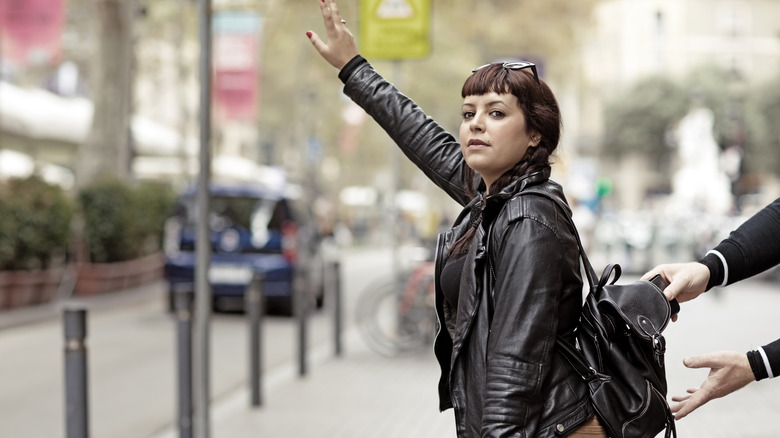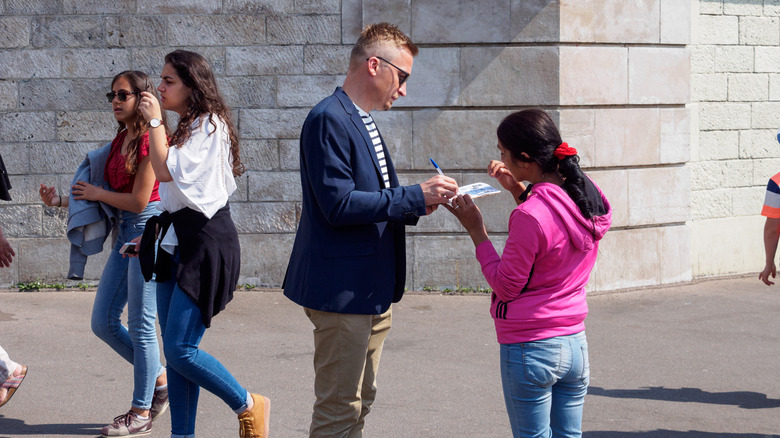The Most Common Scams Tourists Should Know About Before Visiting Paris
Paris may be the city of lovers, but it's also a city of scammers. Since so many millions of tourists flock to the City of Lights every year, there are bound to be thieves looking to strike. And some scams are more common in the city than others. The number of scam victims has risen in the last few years, according to the French Government. Their report from 2022 indicated an increase in petty theft like pickpocketing was on the rise.
From phony petitions to people impersonating monks, some of these common scams may sound familiar. They run rampant in other cities around the world too, but an analysis by Quotezone found Paris was one of Europe's worst hotspots for pickpocketers. Heck, even travel expert Rick Steves was pickpocketed for the first time ever on the Paris metro. Fortunately, Steves has shared some expert tips to avoid getting pickpocketed on your trip to Europe.
When we're distracted by new-to-us marvels and unfamiliar with the city, as tourists, we're easy targets for scammers. So be on the lookout for these common scams the next time you're in Paris to avoid being one of the victims de jour.
The free gift scam
They say not to look a gift horse in the mouth, but when you're in Paris you probably shouldn't look at a gift horse at all. Like in many other cities, there are scammers out and about at major tourist destinations preying on unsuspecting tourists with so-called free gifts. If someone tries to approach you with a free rose, bracelet, book, or anything else, ignore them. It isn't free and they'll demand money from you until you're too embarrassed to say no.
More than just a nuisance, though, this scam can easily become straight theft. According to travel expert Rick Steves on his blog, "These sorts of distractions can also function as a smokescreen for theft — an accomplice is picking your pocket as you try to wriggle away from the pushy vendor." We'll happily add this pickpocket advice to our list of travel tips we've learned from Steves.
The item could be handed to you by a man in monk's robes or a young child. In either case, it's important to remember that nothing is free and you should watch your belongings when these incidents occur.
Faux charities or petition scams
It's hard to say no if someone approaches you and says they're with a charity or other kind of organization. Harder still to turn down signing a petition when it's something worthy of support. But don't let these hardball tactics fool you, the charity could exist though it's highly unlikely you're dealing with a real employee or volunteer.
This scam became so prevalent in Paris that local police issued warnings in 2022 about kids perpetrating the crime. In a post on X, formerly known as Twitter, the police said that if you're approached by kids with petitions, to ignore them, as they would otherwise demand money from you. Alternatively, sometimes scammers will pretend to be deaf to dupe you into giving them money when the inevitable ask comes.
Just like with the pesky free gift scammers, the petition is also a prime opportunity for a pickpocket to snatch your wallet. You're better off trying to ignore the would-be petitioners than to engage with them. Believe us, they don't take "non" for an answer.
The helpful local scam
Sometimes there are friendly strangers in the world, happy to assist someone in a tight spot. Unfortunately for tourists, that's not always the case. Just like with the fake petitioners, scammers and pickpockets can sometimes wear the guise of helpful strangers to lure you into a financial trap.
Rick Steves outlines this common scam on his blog, explaining that these scammers are usually trying to separate you from your wallet. "Some thieves put out tacks and ambush drivers with their 'assistance' in changing the tire," Steves wrote. "Others hang out at subway ticket machines eager to 'help' you, the bewildered tourist, buy tickets with your quickly disappearing foreign cash. If using a station locker, beware of thieves who may have their own key to a locker they'd like you to use."
This scam is particularly problematic on the metro. These scammers are looking to target travelers navigating Paris' difficult ticketing system. When in doubt of someone's intentions, firmly tell them "no" or "non."
The distraction scam
When you're already in awe of the city around you, it's not uncommon for scammers or thieves to take advantage of your distraction. But if you aren't already distracted, they might try to induce it. Whether it involves a beverage spilling on you, someone running into you, or otherwise catching you off guard, this scam is easy enough to pull off — especially in a crowded place like by the Eiffel Tower or outside the Louvre. A distraction scam is the perfect opportunity to snatch your belongings if you aren't keeping a close eye on them in the moment. That's especially tricky if your bag is behind you — as if you needed another reason to think twice before traveling with a backpack.
Another distraction tactic involves the metro. A bunch of scammers will crowd you while boarding or on the train to make any touching seem accidental from movement. However, they are actually trying to pickpocket you and the group of people doing it are likely working together. Someone may also accidentally run into you as a way to pickpocket you, or for their companion to. The hubbub of running into a person is easy cover for a sneaky thief to take what's not theirs.
Beggar cup scam
As if the other scams aren't discombobulating enough, the so-called Clear Cup Scam may be the most devious of all. In this scam, a person acting as a beggar puts a cup with change in the walkway of a high-traffic area. The point? That some unsuspecting person walks by, accidentally, kicks over the change cup, and feels terrible about it. So terrible, in fact, that they'll open their wallet to apologize. As with several of the other scams we've mentioned, the goal is to make you uncomfortable enough to give the scammer what they want.
TikToker Amanda Rollins (@americanfille) talked about this scam happening to her even after living in Paris for years. In her post, she advised anyone who is caught in the scam to try and get away from the situation. "If you're here in Paris and you knock over the cup, don't feel obligated to give money unless you want to, and if they start getting loud with you just keep walking," Rollins suggested. Excellent advice indeed.





